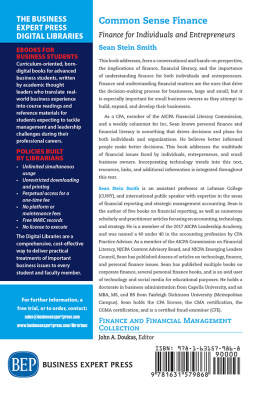
The first effective form of investment was realized when the primitive man discovered that saving a bone for a club to hunt animals was more rewarding than breaking it for its marrow.
ENTREPRENEURIAL FINANCE
Fundamentals of Financial Planning and Management for Small Business
M. J. ALHABEEB
University of Massachusetts Amherst
Copyright 2015 by John Wiley & Sons, Inc. All rights reserved.
Published by John Wiley & Sons, Inc., Hoboken, New Jersey.
Published simultaneously in Canada.
No part of this publication may be reproduced, stored in a retrieval system, or transmitted in any form or by any means, electronic, mechanical, photocopying, recording, scanning, or otherwise, except as permitted under Section 107 or 108 of the 1976 United States Copyright Act, without either the prior written permission of the Publisher, or authorization through payment of the appropriate per-copy fee to the Copyright Clearance Center, Inc., 222 Rosewood Drive, Danvers, MA 01923, (978) 750-8400, fax (978) 750-4470, or on the web at www.copyright.com. Requests to the Publisher for permission should be addressed to the Permissions Department, John Wiley & Sons, Inc., 111 River Street, Hoboken, NJ 07030, (201) 748-6011, fax (201) 748-6008, or online at http://www.wiley.com/go/permission.
Limit of Liability/Disclaimer of Warranty: While the publisher and author have used their best efforts in preparing this book, they make no representations or warranties with respect to the accuracy or completeness of the contents of this book and specifically disclaim any implied warranties of merchantability or fitness for a particular purpose. No warranty may be created or extended by sales representatives or written sales materials. The advice and strategies contained herein may not be suitable for your situation. You should consult with a professional where appropriate. Neither the publisher nor author shall be liable for any loss of profit or any other commercial damages, including but not limited to special, incidental, consequential, or other damages.
For general information on our other products and services or for technical support, please contact our Customer Care Department within the United States at (800) 762-2974, outside the United States at (317) 572-3993 or fax (317) 572-4002.
Wiley also publishes its books in a variety of electronic formats. Some content that appears in print may not be available in electronic formats. For more information about Wiley products, visit our web site at www.wiley.com.
Library of Congress Cataloging-in-Publication Data
Alhabeeb, M. J., 1954
Entrepreneurial finance : fundamentals of financial planning and management for small business / M. J. Alhabeeb.
pages cm
Includes bibliographical references and index.
ISBN 978-1-118-69151-9 (cloth)
1. Small businessFinance. I. Title.
HG4027.7.A44 2015
658.15dc23
2014024598
To My wife Nidal and our children Junior and Reema
PREFACE
As the wrenching changes in the economy continue to push corporations and large companies deep into their struggle to stay competitive, interest in small business and entrepreneurial studies has been rapidly increasing, not only by entrepreneurs and business owners, but also by the public. It is probably in response to the growing trend of downsizing and outsourcing that have been widely practiced by large corporations. The growing interest in the self-employed style of business has been publicly considered safer and more rewarding, especially since small businesses and entrepreneurial projects have proved their ability in initiating successful endeavors, elevating productivity, fueling innovation, and ultimately leading economic progress. Furthermore, embracing small business ventures has largely been looked at as a commitment to the American ideal of free enterprise that cherishes freedom, independence, individuality, hard work, and creativity. Academic response has been matching the public interest, for there has been a significant inclination by students and faculties to study entrepreneurship and explore how to finance, start up, manage, and maintain a small business, as well as examine the efficiency of venture capital investment. These exciting areas of business have grown rapidly in community colleges and public universities and even in increasing number of high schools around the country, as well as globally.
Entrepreneurial finance is the third major field of finance, along with personal finance and corporate finance. It is all about applying the fundamental financial principles and basic theories in the domain of new and small-scale business firms. Moreover, it is adapting those principles and theories for planning and developing, starting up, operating, growing and maturing, valuing, and harvesting entrepreneurial business projects. The nature, needs, and dynamics of a new venture and the entrepreneurial aspect are what primarily characterize and identify entrepreneurial finance and distinguish it from other finance fields. What remains the common ground is the decision-making process and its fundamentals, although it would be different according to the nature and scope of the applications from one finance field to another.
My major objective here is to present a comprehensive and efficient textbook, which would serve as a complete learning package in the area of small business and entrepreneurship. The focus has been on the fundamentals in theory and applications to promote a solid and independent learning experience through detailed and timely information that is helpful in the classroom and beyond. The language in this book is clear, straightforward, and non-technical, in most parts; and the delivery of topics is systematic and easy to follow, emphasizing the learning schemes of exposition, synthesis, analysis, and evaluation. Although the book is written primarily for the upper-level undergraduate students majoring in business, managerial economics, and entrepreneurship, it would still satisfy the academic requirements of the first-year graduate students in business and economics, MBA, and other related majors such as industrial organization and engineering. It is also intended to satisfy the needs for learning flexibility in our classrooms, where a diverse group of students who are taking different paths and having different learning styles are always present. Lastly, the book would perfectly make a useful reference for entrepreneurs and business managers, executives, and researchers.
It was intentional not to make the text heavy with supplemental learning aids, as many of the texts tend to do nowadays. The core purpose, here, is to increase the studying efficiency by focusing on the core material, where a semester is normally not enough to cover that core in its entirety. However, I made each chapter end with a brief summary, a list of key concepts, and ten discussion questions. The questions are straightforward, aiming at reviewing the learned material and placing the concepts in their proper context. Although the covered material is for more than one semester, the organizational breakdown of units and chapters is flexible enough to allow professors to choose the optimal amount of material that would best serve the orientation and focus of their courses.
Topics are organized into four parts with a total of 19 chapters. The first part comes under the title Entrepreneurial Perspective, which is an essential introduction to the whole area of small business. It includes three chapters: Small Business and the Entrepreneur; Small Business Options; and Small Business Purchase Price. The second part is dedicated to the Entrepreneurial Organization. It includes two chapters: Chapter 4 addresses the different forms of business ownership, and Chapter 5 covers the business plan. This is a central chapter that provides the practical and hands-on component of this book. The contents serve as a necessary tool to learn and practice writing and presenting a professional business plan as an essential key in the process of funding and establishing a new venture. The third part presents the core material in this text. It is the Entrepreneurial Finance and Valuation part that is thoroughly covered by nine chapters. Chapter 6 introduces the financial statements and their analysis; Chapter 7 is on capital structure and leverage; Chapter 8 is on profit and the costvolume analysis; and Chapter 9 is on the pro forma statement and financial forecasting. Chapter 10 introduces the working capital, while Chapter 11 discusses the financial management of working capital. Chapter 12 discusses inventory management and control; Chapter 13 explains the process of investment project evaluation and risk management; and Chapter 14 addresses the subject of business valuation and harvesting. The fourth part is entitled Entrepreneurial Management and Control, which covers material that has always been integrated with the financial topics above. It consists of five chapters: Chapter 15 discusses the basic entrepreneurial management; Chapter 16 addresses business layout and location; Chapter 17 covers operations, budgeting, and taxes; Chapter 18 discusses marketing, promotion and distribution, and Chapter 19 wraps up the material of this book by addressing the human resource management.
Next page










